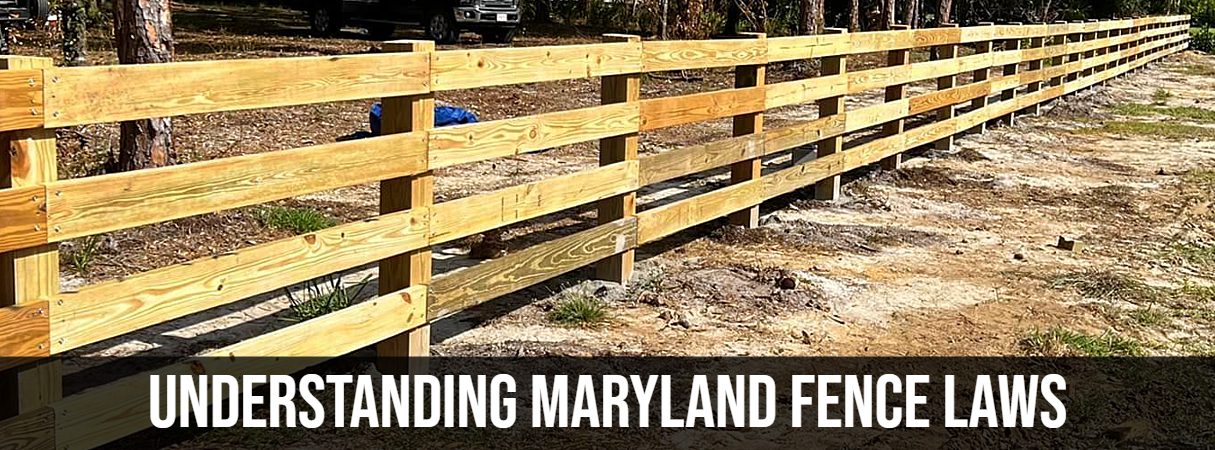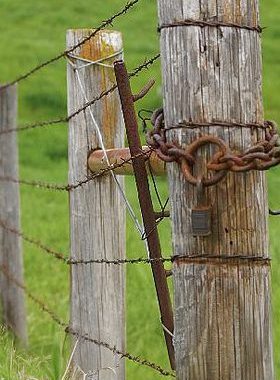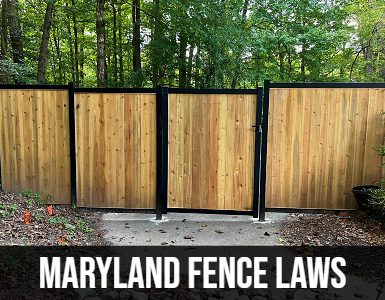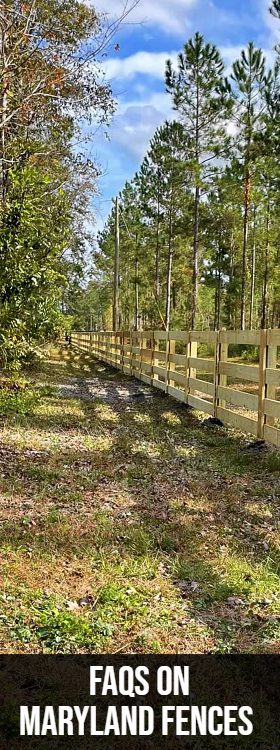
Overview of Maryland Fence Laws
So, you’re ready to build that dream fence—or maybe just fix the one your dog has already claimed as his personal exit route. Before you start digging postholes and picking out fence panels, it’s essential to understand Maryland’s fence laws. The last thing you want is a friendly chat with your neighbor turning into a full-blown legal dispute over who’s responsible for what, or worse, discovering you’ve built your fence on the wrong side of the property line. Let’s dive into Maryland’s fence laws and make sure your fence is as solid as your neighborly relations!

Understanding Maryland’s Fence Laws
The main thing you need to know about Maryland’s fence laws is this: they’re all about keeping the peace. These regulations ensure that everyone’s property rights are respected, and disputes between neighbors don’t get out of hand. Whether you’re building a fence to keep Fido from wandering or simply trying to get some privacy, Maryland’s laws have specific guidelines you need to follow.
In Maryland, most fence laws boil down to property lines, who owns the fence, and who has to maintain it. While these may sound like basic rules, failing to understand them can lead to major headaches. (And let’s be honest, we’re all trying to avoid that awkward conversation that starts with, “Hey, about that fence you built…”)
What Is a Legal Fence in Maryland?
Before you start dreaming about the grand fence you’re going to build, let’s make sure it’s legal. In Maryland, a legal fence is one that follows local ordinances regarding height, materials, and location. Typically, residential fences are limited to six feet in height, although there are exceptions based on your property’s location.
You’ll want to double-check your county’s regulations because some areas—especially those with homeowners’ associations—have strict guidelines about the appearance and structure of fences. Thinking of building a 10-foot-high fortress? Think again, unless you’ve got a strong case and possibly a permit in hand.
Who’s Responsible for Fence Repairs & Maintenance?
Sharing a fence with your neighbor? It’s important to know who’s responsible for maintenance. In Maryland, if the fence is directly on the property line, both neighbors are usually responsible for repairs and upkeep. However, if the fence is entirely on your property, it’s all on you to maintain it. So, if a storm takes down a section of your shared fence, it’s time for a friendly chat with your neighbor about splitting the repair bill. Nobody wants to be the one holding up a sagging fence for months.
Property Line Disputes & Boundary Fences
Fences and property lines—two things that go hand in hand, and also the source of many neighborly disputes. Before you install that fence, it’s smart to get a property survey. Building a fence over the property line, even by an inch, can cause legal headaches. For instance, if your neighbor notices your fence has encroached on their land, they have every right to ask you to remove or move it.
Maryland’s boundary fence laws are fairly straightforward: If the fence sits on the property line and benefits both parties, the cost and responsibility of building or repairing it are shared. But here’s the catch: if your neighbor doesn’t agree to the fence, they aren’t required to contribute to its construction or maintenance. Spite fences, built purely to irritate a neighbor, are also illegal in Maryland and can result in legal action if proven.

What Happens if Your Fence Crosses the Property Line?
Here’s a nightmare scenario: You’ve finished your beautiful new fence only to find out later that it’s technically on your neighbor’s property. Uh-oh. In Maryland, if your fence crosses a property line, your neighbor has every right to ask you to remove it or move it back onto your property. This is why having a property survey done before you build is critical. Trust us, moving a fence after it’s built is a lot harder than getting the placement right the first time. Plus, who needs the extra drama of a neighbor’s wrath?
Permits & Building Regulations in Maryland
Before you start digging those postholes, make sure you check whether you need a permit. In Maryland, some counties require permits for fences, especially if they’re above a certain height or located in specific zones (like historical districts or Baltimore County). For example, Howard County requires a permit for fences over 6 feet tall, while Baltimore County mandates permits for fences taller than 42 inches. Carroll County also enforces a permit requirement for pool fences, ensuring they meet safety standards.
If you’re building near water or on a corner lot, additional regulations may apply. In Anne Arundel County, fences on waterfront properties are reviewed to ensure they don’t block your neighbor’s view or sunlight. Meanwhile, fences on corner lots need to be kept under 3 feet to maintain driver visibility at intersections.
Trust us, getting a permit now is a lot easier than dealing with fines later—or worse, being told to tear the whole thing down. And don’t forget to call 811 two business days before you dig to avoid hitting any underground utility lines. It’s a quick step that can prevent costly (and dangerous) mistakes.
Final Thoughts on Maryland Fence Laws
Building a fence in Maryland doesn’t have to be complicated, but a little planning goes a long way. Understanding local fence laws—like height restrictions, property line rules, and who’s responsible for repairs—will save you a lot of hassle later. Plus, checking if you need a permit is way easier than dealing with fines or tearing down a fence after it’s built.
Before you start, have a quick chat with your neighbor. Maryland laws may not require it, but it’s a simple way to avoid potential disputes and keep things neighborly. A little heads-up can prevent awkward conversations down the road. In the end, following the rules and being courteous will ensure your fence enhances your property without creating drama. Build smart, stay friendly, and enjoy your new space with peace of mind. After all, a solid fence should bring peace, not problems.
Frequently Asked Questions (FAQs)

1. Do I Need a Permit to Build a Fence in Maryland?
Yes, in most cases, a permit is required. For example, Baltimore County requires a permit for fences over 42 inches tall, and Howard County mandates permits for fences taller than 6 feet. Always check with your local county for specific requirements based on height and location (e.g., historical districts or waterfront properties).
2. What Are the Height Restrictions for Fences in Maryland?
Fence height restrictions vary by county. Generally, backyard fences can be up to 6 feet tall, while front yard fences are limited to around 42 inches. If you’re on a corner lot, the height may need to be under 3 feet to avoid obstructing traffic views.
3. Who Is Responsible for Maintaining a Shared Fence?
In Maryland, if a fence is built on the property line, both neighbors are typically responsible for its maintenance. However, if the fence is built entirely on one person’s property, that individual is responsible for repairs and upkeep.
4. Can I Build a Fence on My Neighbor’s Property or on the Property Line?
No, you cannot legally build a fence on your neighbor’s property. If you want to place a fence on the property line, both you and your neighbor must agree to it. It’s always recommended to have a survey done before starting any construction to avoid disputes.
5. Are There Specific Rules for Pool Fences in Maryland?
Yes, Maryland requires that in-ground swimming pools must be enclosed by a fence at least 4 feet high with a self-latching gate. This applies to prevent accidents and ensure safety, and the exact requirements may vary slightly by county.